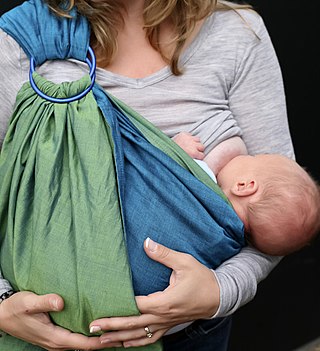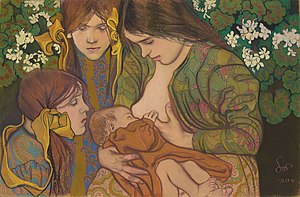
A breast pump is a mechanical device that lactating women use to extract milk from their breasts. They may be manual devices powered by hand or foot movements or automatic devices powered by electricity.

Weaning is the process of gradually introducing an infant human or another mammal to what will be its adult diet while withdrawing the supply of its mother's milk.

Attachment parenting (AP) is a parenting philosophy that proposes methods aiming to promote the attachment of parent and infant not only by maximal parental empathy and responsiveness but also by continuous bodily closeness and touch. The term attachment parenting was coined by the American pediatrician William Sears. There is no conclusive body of research that shows Sears' approach to be superior to "mainstream parenting".
William Penton Sears, also referred to as Dr. Bill, is an American pediatrician and the author or co-author of parenting books. Sears is a celebrity doctor and has been a guest on various television talk shows. Sears is a proponent of the attachment parenting philosophy and is most well known for authoring The Baby Book, which popularized that style of parenting.

Breast milk or mother's milk is milk produced by the mammary glands in the breast of human females. Breast milk is the primary source of nutrition for newborn infants, comprising fats, proteins, carbohydrates, and a varying composition of minerals and vitamins. Breast milk also contains substances that help protect an infant against infection and inflammation, such as symbiotic bacteria and other microorganisms and immunoglobulin A, whilst also contributing to the healthy development of the infant's immune system and gut microbiome.
La Leche League International (LLLI) is a non-governmental, non-profit organization that organizes advocacy, education, and training related to breastfeeding. It is present in about 89 countries.

The history and culture of breastfeeding traces changing social, medical and legal attitudes to breastfeeding, the act of feeding a child breast milk directly from breast to mouth. Breastfeeding may be performed by the infant's mother or by a surrogate, typically called a wet nurse.

Breastfeeding difficulties refers to problems that arise from breastfeeding, the feeding of an infant or young child with milk from a woman's breasts. Although babies have a sucking reflex that enables them to suck and swallow milk, and human breast milk is usually the best source of nourishment for human infants, there are circumstances under which breastfeeding can be problematic, or even in rare instances, contraindicated.

Breastfeeding, or nursing, is the process by which human breast milk is fed to a child. Breast milk may be from the breast, or may be pumped and fed to the infant. The World Health Organization (WHO) recommends that breastfeeding begin within the first hour of a baby's life and continue as often and as much as the baby wants. Health organizations, including the WHO, recommend breastfeeding exclusively for six months. This means that no other foods or drinks, other than vitamin D, are typically given. The WHO recommends exclusive breastfeeding for the first 6 months of life, followed by continued breastfeeding with appropriate complementary foods for up to 2 years and beyond. Of the 135 million babies born every year, only 42% are breastfed within the first hour of life, only 38% of mothers practice exclusive breastfeeding during the first six months, and 58% of mothers continue breastfeeding up to the age of two years and beyond.

Breastfeeding promotion refers to coordinated activities and policies to promote health among women, newborns and infants through breastfeeding.

In Western countries extended breastfeeding usually means breastfeeding after the age of 12 to 24 months, depending on the culture.

World Breastfeeding Week (WBW) is an annual celebration which is held every year from 1 to 7 August in more than 120 countries. According to the 26 August data of WBW website, 540 events have been held worldwide by more than 79 countries with 488 organizations and 406,620 participants for the World Breastfeeding Week 2010.

Diana West is a leading lactation consultant and author specializing on the topic of breastfeeding.
Diane Wiessinger is an American breastfeeding advocate, author and researcher who is known for her essay "Watch your language!", which asserts that breastfeeding is normal, not superior. The term "Wiessingerize" in the circles of breastfeeding advocates means to talk about breastfeeding as the norm to which other forms of nurturing and nourishing children is compared.

A lactation consultant is a health professional who specializes in the clinical management of breastfeeding. The International Board of Lactation Consultant Examiners (IBLCE) certifies lactation consultants who meet its criteria and have passed its exam.

Trevor Kirczenow is a transgender health researcher and diabetes healthcare advocate. He is an author and community organizer in the field of LGBTQ lactation and infant feeding. He has run twice as a candidate for the Liberal Party of Canada.
Breastfeeding and medications is the description of the medications that can be used by a breastfeeding mother, and the balance between maternal health and the safety of the breastfeeding infant. Medications, when administered to breastfeeding mothers, almost always are transferred to breast milk, albeit usually in small quantities. The degree of impact on the nursing infant varies, with many medications posing minimal risk. Nonetheless, informed decision-making and professional guidance is needed.

Contraindications to breastfeeding are those conditions that could compromise the health of the infant if breast milk from their mother is consumed. Examples include galactosemia, untreated HIV, untreated active tuberculosis, Human T-lymphotropic virus 1 or II, uses illicit drugs, or mothers undergoing chemotherapy or radiation treatment.
Mary Ann Kerwin is an American lawyer and breastfeeding activist. One of the seven founders of La Leche League in 1956, she established the Colorado branch of the advocacy group and drafted state laws on behalf of women who breastfeed their infants in public and in the workplace. She was inducted into the Colorado Women's Hall of Fame in 2012.

Breastfeeding and mental health is the relationship between postpartum breastfeeding and the mother's and child's mental health. Research indicates breastfeeding may have positive effects on the mother's and child's mental health, though there have been conflicting studies that question the correlation and causation of breastfeeding and maternal mental health. Possible benefits include improved mood and stress levels in the mother, lower risk of postpartum depression, enhanced social emotional development in the child, stronger mother-child bonding and more. Given the benefits of breastfeeding, the World Health Organization (WHO), the European Commission for Public Health (ECPH) and the American Academy of Pediatrics (AAP) suggest exclusive breastfeeding for the first six months of life. Despite these suggestions, estimates indicate 70% of mothers breastfeed their child after birth and 13.5% of infants in the United States are exclusively breastfed. Breastfeeding promotion and support for mothers who are experiencing difficulties or early cessation in breastfeeding is considered a health priority.
















